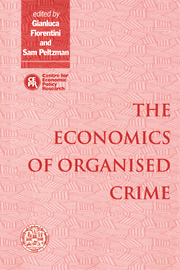Book contents
- Frontmatter
- Contents
- List of figures
- List of tables
- Foreword
- Acknowledgements
- List of conference participants
- 1 Introduction
- PART I THEORIES OF THE STATE AND THE ORIGIN OF CRIMINAL ORGANISATIONS
- PART II THE CRIMINAL ORGANISATION AS A FIRM
- PART III ORGANISED CRIME AND STATE INTERVENTION IN THE ECONOMY
- 6 Rival kleptocrats: the mafia versus the state
- Discussion
- 7 Corruption: arm's-length relationships and markets
- Discussion
- PART IV DETERRENCE POLICIES AGAINST LEGAL FIRMS INVOLVED IN ILLEGAL ACTIVITIES
- PART V DETERRENCE POLICIES AGAINST ORGANISED CRIME
- Index
6 - Rival kleptocrats: the mafia versus the state
Published online by Cambridge University Press: 04 August 2010
- Frontmatter
- Contents
- List of figures
- List of tables
- Foreword
- Acknowledgements
- List of conference participants
- 1 Introduction
- PART I THEORIES OF THE STATE AND THE ORIGIN OF CRIMINAL ORGANISATIONS
- PART II THE CRIMINAL ORGANISATION AS A FIRM
- PART III ORGANISED CRIME AND STATE INTERVENTION IN THE ECONOMY
- 6 Rival kleptocrats: the mafia versus the state
- Discussion
- 7 Corruption: arm's-length relationships and markets
- Discussion
- PART IV DETERRENCE POLICIES AGAINST LEGAL FIRMS INVOLVED IN ILLEGAL ACTIVITIES
- PART V DETERRENCE POLICIES AGAINST ORGANISED CRIME
- Index
Summary
Until two or three hundred years ago, it was characteristic almost everywhere – and to this day, it is characteristic in the majority of countries and in countries containing the majority of the world's population – that the primary government activity was and is extraction of surpluses from the predominantly agricultural population and use of such surpluses, to benefit tiny groups of people in and near the government. Edwin Mills, The Burden of Government (1986), p. 134
Republicans and Democrats have forged a political class to divy up the spoils, fighting only over precisely how to pick pockets. The Wall Street Journal, October 24, 1990
Introduction
Motivated by observations such as these, recent research has developed a positive theory of what I have called ‘proprietary public finance’, or, more colourfully, ‘kleptocracy’. [See, for example, Lane, 1958; Auster and Silver, 1979; Lai, 1988; Bardhan, 1990; Findlay, 1990; or Grossman and Noh, 1990, 1994.] This theory assumes that the objective of the state's tax and spending policy is to extract maximum rent for the group that comprises the ruling class or political establishment. Historical examples of such groups include a monarchy and its court, the professional politicians, the bureaucrats, the members of the ruling party, or the military. In stable democracies, the existing political establishment can be an explicit or implicit coalition that draws in political factions regardless of party labels.
- Type
- Chapter
- Information
- The Economics of Organised Crime , pp. 143 - 155Publisher: Cambridge University PressPrint publication year: 1996
- 13
- Cited by



